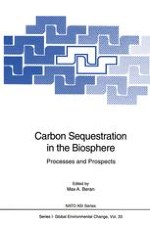1995 | OriginalPaper | Buchkapitel
In Terrestrial Ecosystems
verfasst von : Martin R. Carter, David O. Hall
Erschienen in: Carbon Sequestration in the Biosphere
Verlag: Springer Berlin Heidelberg
Enthalten in: Professional Book Archive
Aktivieren Sie unsere intelligente Suche, um passende Fachinhalte oder Patente zu finden.
Wählen Sie Textabschnitte aus um mit Künstlicher Intelligenz passenden Patente zu finden. powered by
Markieren Sie Textabschnitte, um KI-gestützt weitere passende Inhalte zu finden. powered by
The purpose of the Workshop session ‘Carbon sequestration in Terrestrial Ecosystems’ was to identify and categorise possible management options for the enhancement of carbon storage in various terrestrial ecosystems, and to characterise some of the processes involved with the most promising options. Major vegetation types or ecosystems, as described by Goudriaan (1992), provided a framework to discuss management options for carbon sequestration on a global scale. The concept of ‘mean carbon storage’ (MCS) was used to characterise carbon sequestration. This term is taken from a carbon storage model developed for managed forests (Cooper, 1983), which calculates the average carbon storage (in living vegetation, detritus, and soil) over the lifetime of a forest, under dynamic conditions (ie managed for maximum sustained yield of biomass). In this paper, MCS was considered over a nominal 50 year time scale. This implies that the increased carbon pool or storage, in a specific vegetation type or ecosystem, as a result of the management option would be sustained for at least 50 years. Restriction to this time frame was considered important in the identification of viable management options which would become operational in the relatively near future. The various management options were ranked from 1 (ie small) to 5 (ie large) according to their potential to achieve the desired MCS as defined above.
